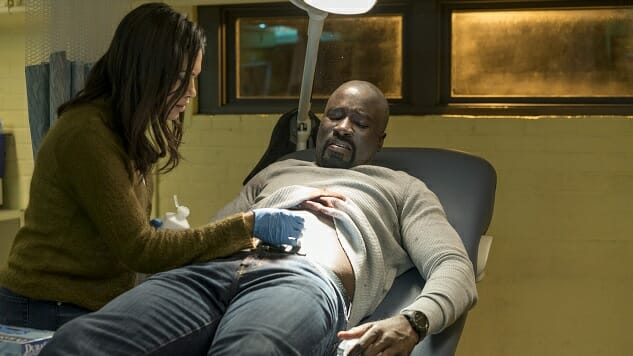Is Luke Cage‘s Introduction of Diamondback Too Little, Too Late?
(Episodes 1.07 and 1.08)
Netflix
Luke Cage, it seems, has been taking the long way around the barn. On one hand, hey: Everyone likes taking leisurely strolls around agricultural structures. On the other hand, we’re watching a show set in New York City, where everyone’s in a big damn hurry to get everywhere, and more than that, we’re watching a show that’s had all the instruments for building conflict locked up in its toolbox this whole time. The good news is, that conflict’s foundation is rock solid. The bad news is, we’ve taken eight episodes to get there, and there’s no good reason for the delay. (This, perhaps, is the double-edged sword of telling stories on television: A wide open creative sandbox sounds like a sweet deal, but even a playground needs boundaries.)
No matter. Sort of. There’s a pair of plot points sprinkled throughout “Manifest” and “Blowin’ Up the Spot” that Luke Cage could have deployed in the first half of the season for the betterment of its late-stage narrative, one involving Stokes, the other involving the show’s secondary villain, Willis Stryker (Erik LaRay Harvey)—an imposing, vicious man with a penchant for spouting Bible quotes as easily as he squeezes off Judas bullets aimed in Luke’s direction. Like Stokes, Willis has a nickname of reptilian origins. Unlike Stokes, Willis carries that moniker—Diamondback—with pride. (It’s a safe bet based on geography that he self-identifies with the species’ Eastern variety, reputed as the most dangerous in the country.)
Diamondback’s method of attack is appropriate to his nom de guerre; the Judas bullet is to Luke as poison is to the rest of us, splintering into shrapnel fragments that begin the grim work of shredding his innards upon entry. (Okay, fair: The bullet would be to the rest of us as it is to Luke, too, only your average man would probably die where Luke grins, bears it, and kicks Diamondback’s ass.) Watching Luke run into an adversary he can’t simply walk through with his mitts is fun, refreshing even, especially after seeing him do just that in around two episodes too many. Diamondback cannot presently go toe-to-toe in a fist fight, true, but his shrewd use of the Judas bullet weakens Luke enough to make their encounters slightly less one-sided: Luke could still wreck his opponent with his bare hands, except that his opponent keeps hitting him right in his gut wound.
As good a time as Diamondback is, Stokes is even better, though we must bid our farewells both to him and to Mahershala Ali. (Maybe don’t accuse a sexual abuse victim of wanting it, especially if she’s kin to an infamous gangster, and even more especially if she’s on edge.) Stokes’ departure in “Manifest” leaves the character in a weird place of resolution: By the time Mariah goes totally sickhouse on him, we’ve learned that the man he is differs wildly from the boy he was, and our sympathies pile on him the more time we spend with him in flashbacks to his youth. Up until now, it’s been a pleasure watching Luke out-muscle and outwit him at every turn, and yet there’s no pleasure to be had in how the man meets his sad, defeated, utterly lonesome end. You want to feel sorry for him. You do feel sorry for him. Stokes is a sorry, sorry man. He deserved better.
Not just in life, mind you, but in drama, too. Watching Stokes shuffle off this mortal coil less than an hour after revealing that he knows Cage’s secret is a head-scratcher: Pray tell, how did that fail to come up at literally any other time leading up to “Manifest,” and why, as soon as it does, must Stokes be deleted from Luke Cage’s growing coterie of heavies? Stokes’ knowledge of Luke’s past is exactly what the story has needed since the very beginning: leverage against an indestructible hero. That’s the only way guys like Stokes can reasonably tangle with guys like Luke, not with brawn but with bargaining chips and blackmail. (And brains, though if Stokes’ ill-advised taunt of Mariah tells us anything, it’s that he’s not as smart as he thinks he is.)
-

-

-

-

-

-

-

-

-

-

-

-

-

-

-

-

-

-

-

-

-

-

-

-

-

-

-

-

-

-

-

-

-

-

-

-

-

-

-

-








































